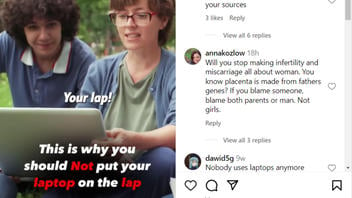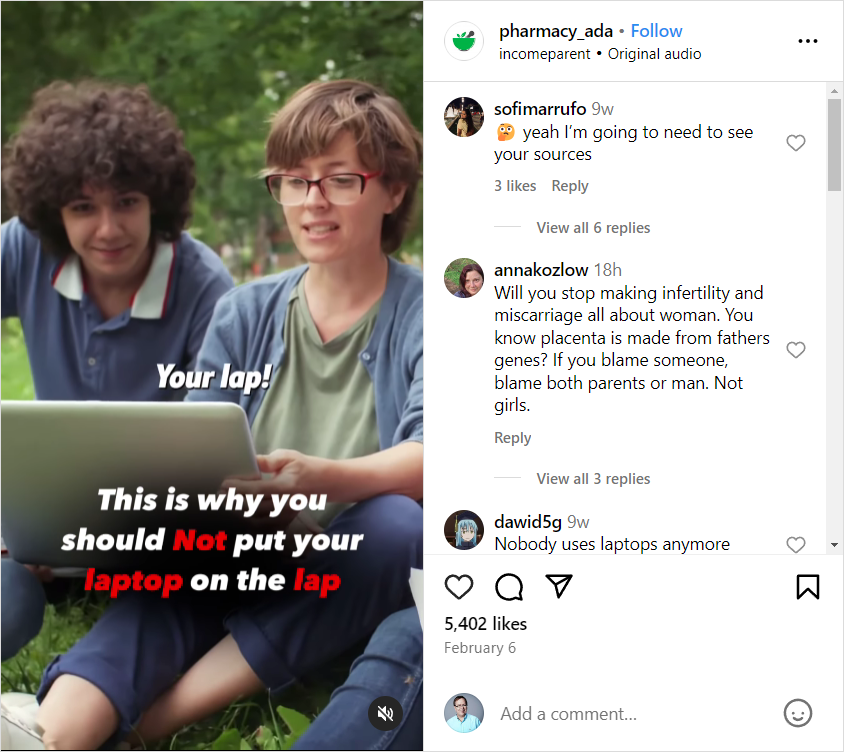
If preteen and teenage girls use laptop computers on their laps, will it increase their risk of miscarriages later in life? No, that's not true: The Centers for Disease Control and Prevention told Lead Stories, "The claims in the video are inaccurate." There's no scientific evidence to support the allegations; miscarriages are typically caused by factors like genetic abnormalities, hormonal imbalances, infections and other health issues of the mother, rather than laptop use.
The claim appeared in a post and video (archived here) on Instagram by pharmacy_ada on February 6, 2024. The on-screen headline said:
This is why you should Not put your laptop on the lap.
This is what the post looked like on Instagram at the time of writing:
(Source: Instagram screenshot taken on Tue Apr 16 15:52:38 2024 UTC)
The video
The woman featured in the 58-second video is controversial wellness coach Barbara O'Neill. In the clip, she states that a laptop computer is a risk to girls ages 10 to 15 and their future pregnancies. O'Neill said:
The worst place to put your laptop is where? Your lap! There's about 8,000 studies to show this that young girls having the laptop on their lap between the age of say 10, 11, 12, 13, 14, 15.
Let's fast forward to when they're in their 30s having a baby 47% miscarriage. Because it's affecting the developing of the eggs when they are just in adolescence.
So have it on a bench. Have it on a desk. Have it away for you.
Neither O'Neill nor the social media post offered any evidence to support the claim about laptops and miscarriages later in life, only suggesting that "electromagnetic field exposure" could be the culprit.
Response to claim: Centers for Disease Control and Prevention
In an April 17, 2024, email to Lead Stories, Nick Spinelli, a public affairs specialist with the Centers for Disease Control and Prevention (CDC), provided the public health agency's response, saying "The claims in the video are inaccurate." He continued:
Radio frequency (RF) energy or radiation is a type of electromagnetic radiation, and while the term 'radiation' can be alarming (and some types of radiation can be very hazardous), RF is considered non-ionizing radiation because it has very low energy and cannot remove electrons from atoms (which can lead to damage in cells).
There are many common sources and/or uses of radio frequency radiation, including laptops as well as radio and tv broadcasting, cell phones, microwaves, radar, Bluetooth® devices, and magnetic resonance imaging (MRI) machines, among many others.
The International Commission on Non-Ionizing Radiation Protection (ICNIRP) stated in their 2020 updated guidelines that they found, 'No adverse effects of radiofrequency EMF exposure on fertility, reproduction, or development relevant to human health have been substantiated.'
Additional details about non-ionizing radiation in work environments and its impact on reproductive health can be found on the CDC webpage: Nonionizing Radiation-Reproductive Health.
Miscarriages
According to the Mayo Clinic website (archived here), a miscarriage, the sudden loss of a pregnancy before the 20th week, occurs in about 10 to 20 percent of known pregnancies. The website continued:
But the actual number is likely higher. This is because many miscarriages happen early on, before people realize they're pregnant.
The National Library of Medicine (archived here) says that a majority of miscarriages occur due to chromosome abnormalities that hinder the baby's development. In rare instances, these abnormalities may be linked to the genetic makeup of either the mother or the father.
Other possible causes of miscarriage may include:
- Drug and alcohol abuse
- Clotting disorders
- Exposure to environmental toxins
- Hormone problems
- Infection
- Overweight
- Physical problems with the mother's reproductive organs
- Problem with the body's immune response
- Serious body-wide (systemic) diseases in the mother (such as uncontrolled diabetes)
- Smoking
Barbara O'Neill
O'Neill is well-known in the alternative medicine community but was sanctioned by Australia's New South Wales Health Care Complaints Commission (HCCC) in 2019. A statement from the HCCC, following an investigation, said:
The Commission is satisfied that Mrs O'Neill poses a risk to the health or safety of members of the public. The Commission therefore makes the following prohibition order:
- Mrs O'Neill is permanently prohibited from providing any health services, as defined in s4 of the Health Care Complaints Act 1993 (the Act), whether in a paid or voluntary capacity.
Read more
Additional Lead Stories fact checks of claims related to O'Neill can be found here.


















